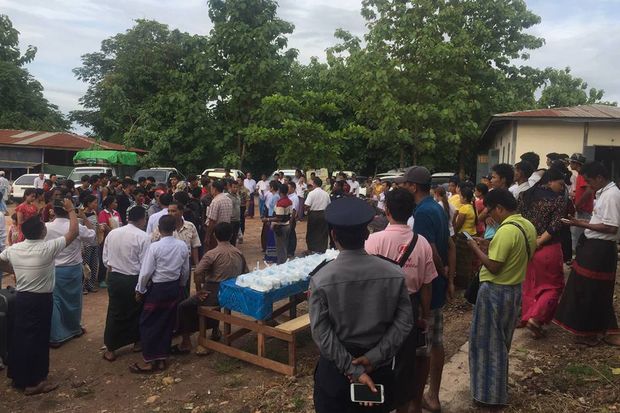
Thailand and Myanmar have agreed to set up a joint working committee to solve labour problems arising from confusion over Thailand's tough new migrant worker rules.
Labour Minister Gen Sirichai Distakul flew to Myanmar on Friday to meet Thien Swe, his Myanmar counterpart, in Nay Pyi Taw to discuss the new Thai law on migrant workers.
The meeting followed a chaotic week in which the military government was forced to suspend enforcement of tough new regulations for six months after tens of thousands of frightened foreign migrants left the country.
Thailand has asked Myanmar to speed up verifying the identities of workers and to issue them certificates of identity, the equivalent of passports for those without them, so that they can work legally in Thailand, Varanon Peetiwan, director-general of the Employment Department, said on Saturday.
Thailand also proposed the setup of a joint working committee to sort out problems that may arise during the six-month period before the new regulations take effect.
Myanmar officials reportedly accepted the Thai proposals and asked Thailand to spread the news among Myanmar labourers and ensure they are treated fairly under employment contracts.
Myanmar also asked about the number of workers in Thailand so it can prepare resources to register its nationals. It also asked Thailand to check employers’ demand letters to ensure the numbers match to prevent problems stemming from illegal workers. It also asked Thailand to verify labour documents carefully to prevent imposters.
Mr Varanon said Thailand also asked Myanmar to set up identity verification centres in border areas to issue certificates of identity for workers returning to Thailand, where Thailand could also issue visas and work permits as required.
There are an estimated 4 million foreign workers in the country but anywhere between 1 million and 2 million are said to be illegal. This is partly because the registration process is cumbersome and expensive. Corruption is also widespread.
As a result, many employers hire people under the table, pay them less than the minimum wage and offer very few protections.
The military government last month issued the new decree hurriedly and with minimal consultation of businesses and employers, saying it urgently needed to show the world that it was getting tough on human trafficking.
The decree, effective from June 22, called for heavy fines ranging from 400,000 to 800,000 baht per unregistered worker. That triggered an exodus of illegal workers as Thai employers stopped hiring them and a sudden shortage of labour in Thailand.
Gen Prayut Chan-o-cha, as chief of the National Council for Peace and Order, issued a Section 44 order delaying the enforcement of some sections of the law for 180 days, during which both employers and employees have to take action to comply with the new law.